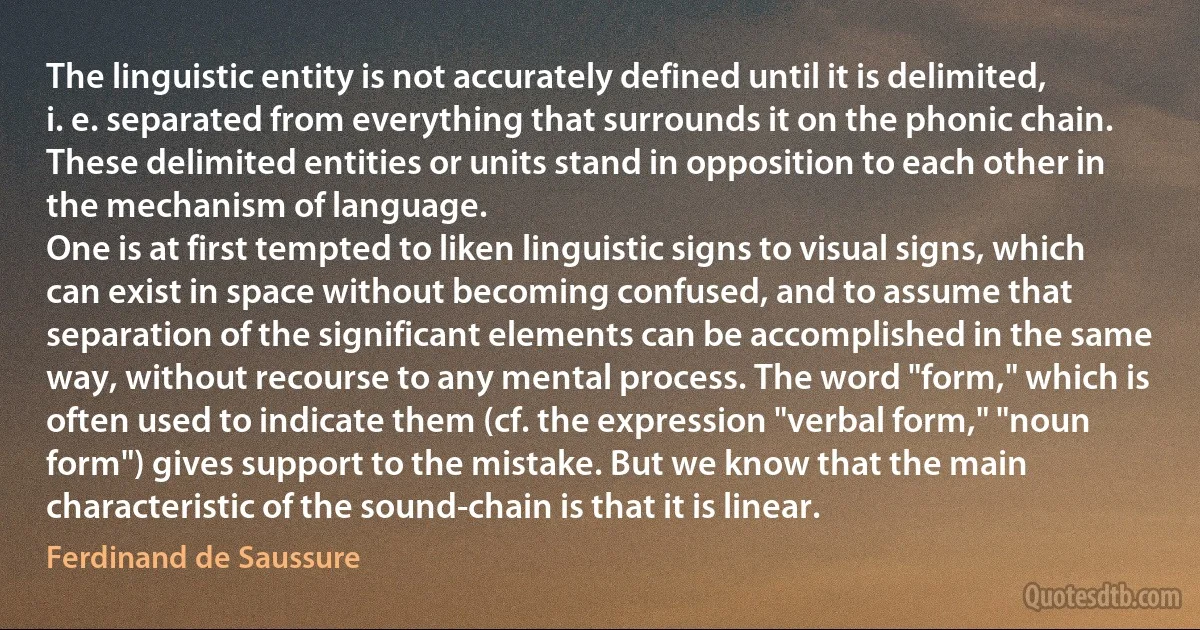Verbal Quotes - page 6
As for acquiescing in what a man understands not, or cannot reconcile to his reason, they know best the fruits of it that practice it. For my part, I'm a stranger to it, and cannot reconcile myself to such a principle. On the contrary, I am pretty sure he pretends in vain to convince the judgment, who explains not the nature of the thing. A man may give his verbal assent to he knows not what, out of fear, superstition, indifference, interest, and the like feeble and unfair motives: but as long as he conceives not what he believes, he cannot sincerely acquiesce in it, and remains deprived of all solid satisfaction. ... But he that comprehends a thing, is as sure of it as if he were himself the author.

John Toland
Pāṇini had before him a list of irregularly formed words, which survives, in a somewhat modified form, as the Uṇādi Sūtra. There are also two appendixes to which Pāṇini refers: one is the Dhātupāṭha, "List of Verbal Roots," containing some 2000 roots, of which only about 800 have been found in Sanskrit literature, and from which about fifty Vedic verbs are omitted; the second is the Gaṇapāṭha, or "List of Word-Groups," to which certain rules apply. These gaṇas were metrically arranged in the Gaṇaratna-mahodadhi, composed by Vardhamāna in 1140 A. D.

Pāṇini
The Pāṇinian commentator Kātyāyana (c. 3rd–4th century BCE) knew of the coexistence of Middle Indic forms with earlier ones. There is a Pāṇinian rule that provides that verb bases listed in an appendix to the Aṣṭādhyāyī have the class name dhātu (verbal base, root). Kātyāyana discusses whether one could define verbal bases semantically and thereby possibly do without the verb list. He remarks that even if one defines a verbal base as denoting an action, the roots must be listed in order to preclude the possibility that constituents of terms such as āṇapayati/āṇavayati ‘commands' be assigned the class name in question; āṇapayati/āṇavayati is a Middle Indic counterpart of Sanskrit ājñāpayati.

Pāṇini
[T]he view that anti-Communism equals Fascism remained obligatory in countries subject to Communist censorship until the advent of Mikhail Gorbachev's glasnost. It was prevalent also in foreign ‘progressive' circles. Western scholars who had the temerity to link Mussolini or Hitler with Communism in any way or to depict their regimes as genuine mass movements risked verbal or other forms of harassment.

Richard Pipes
The subject detects the presence and interrelationships of the basic components of one of the two-dimensional drawings - particularly, the variously oriented straight lines, the several types of vertices by which they are connected and, presumably, something of the structural relationships among these components within the two-dimensional pattern. Then, on the basis of some higher-level processing of these extracted features and their interrelationships, an internal representation, code, or verbal description is generated for each picture separately that captures the intrinsic structure of the three-dimensional object in a form that is independent of the particular orientation in which that object happens to be displayed.

Roger Shepard
The various structures of sentences in any given language, comprising for example at least two nominal pieces and a verbal piece must be collated, and such categories as voice, mood, affirmative, negative, tense, aspect, gender, number, person and case, if found applicable and valid in descriptive statement, are to be abstracted from, and referred back to the sentence as a whole.

John Rupert Firth
'Constitutional' is just a real pip of a word. Positively rolls off the tongue. In fact, it's downright fun to say. 'Con-stit-too-shun-al.' It's the verbal equivalent of skipping down the street with an ice cream cone in your hand. It's like a semantic bag of Lays potato chips. You simply can't just say it once.

Paul Feig



